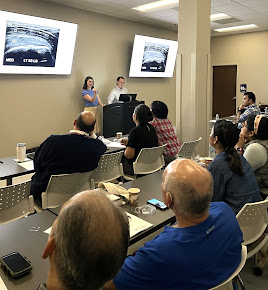 |
| Medical student Landon Rawlins practices his clinical skills on a manikin at the Whiddon College of Medicine Simulation Center. |
The Whiddon COM Simulation Center is located on the third floor of the Health Simulation Building on the University of South Alabama campus. The department serves the College of Medicine as well as USA Health providers and residents, offering innovative simulation resources and educational support.
The first and second floors of the building are utilized by the USA Simulation Program, which serves the College of Nursing and the Covey College of Allied Health Professions. In addition to the spaces within the Health Simulation Building, both departments share simulation lab facilities at University Hospital and Children & Women’s Hospital.
In her role as the assistant dean for medical education, Laura Boatright, M.D., oversees the development and implementation of simulation-based medical education at the Whiddon COM Simulation Center. At the heart of the program is a dedicated team of trained simulationists with extensive experience in scenario development and event coordination. Sarah Steffens, assistant director of high-fidelity simulations, and Nikki Hall, standardized patient educator, work in close collaboration with course directors, department coordinators, and faculty to define clear learning objectives and design simulation experiences that are realistic, engaging, and tailored to meet curricular goals.
‘Practice makes perfect’
Simulation plays a vital role in medical education. “Through hands-on training, students are able to develop essential skills, make and learn from mistakes, and build the confidence that comes from experience,” said Craig Walker, assistant director of simulation operations at the Whiddon College of Medicine. “Many of our simulation activities are designed to be collaborative, encouraging teamwork and communication among learners.”
 |
Medical student Vanessa Vega takes a standardized patient's blood pressure. |
Additionally, students work with standardized patients (SPs) to refine their interview techniques, conduct thorough history-taking, perform physical exams, and become more comfortable interacting with patients in a clinical setting. Throughout the academic year, students also attend dedicated ultrasound sessions to further enhance their diagnostic and procedural skills.
During their clerkship rotations, third-year medical students actively utilize the simulation center as part of their orientation and ongoing skills development. The simulation center collaborates with clerkships in emergency medicine, internal medicine, obstetrics and gynecology, pediatrics, neurology, and surgery. At the start of each rotation, students participate in orientation sessions designed to reinforce essential clinical skills.
Beyond orientation, many groups return to the simulation center throughout their rotations for additional sessions that allow them to further refine and build on their procedural and decision-making skills. This continuity of simulation-based learning helps bridge the gap between classroom instruction and real-world patient care.
“These sessions are important because, as the saying goes, practice makes perfect,” said Megan Thompson, internal medicine clerkship coordinator. “Within a simulated encounter, students can practice their history taking and exam skills and perfect their bedside manner in a controlled environment, away from the pressure of interacting with real patients.”
Thompson said even though students are taking care of patients at this stage of their training, simulation is still an extremely valuable tool. “The set encounters allow for a degree of standardization that they wouldn't be able to get in their regular hands-on experiences,” she explained. “We can also expose them to specific situations that may or may not ever come up authentically in their actual clinical shifts, such as handling situations of domestic violence, so that they can get some supervised practice and feedback on the encounters.”
Training residents and providers
The Whiddon COM Simulation Center also offers residents and providers a dynamic environment where they can be fully immersed in clinical scenarios and work through critical decision-making processes before encountering these situations in real life.
For instance, emergency medicine residents at the on-campus simulation center manage complex trauma cases such as gunshot wounds, focusing on wound treatment and airway management. Pediatric residents have trained at the Children & Women’s Hospital Simulation Lab, treating an infant simulator presenting with RSV, practicing nebulizer use and intubation techniques. Internal medicine residents enhance their procedural proficiency by working with central line trainers at the University Hospital Simulation Lab.
 |
Pediatric providers participate in a point-of-care ultrasound workshop. |
“The event was a great success,” said Gangajal Kasniya, MBBS, a neonatologist and an assistant professor of pediatrics. Approximately 25 faculty members from various divisions attended the workshop, led by 12 instructors including Kasniya.
“Dr. Laura Boatright, Sarah Steffens, and Craig Walker were incredibly helpful throughout the event,” Kasniya said. “The facility was exceptionally well-organized and fully equipped for hands-on learning, and they also arranged standardized patients, which added great value. The high-quality simulation equipment enabled realistic and immersive training.”
Kasniya said he plans to collaborate with the Whiddon COM Simulation Center to make the workshop an annual CME event, inviting participants from across the state and other institutions. The pediatrics residency program is launching a POCUS curriculum starting in July, and the simulation center will play a key role in its implementation.
Expanding opportunities
Walker said the past year has been a time of exciting growth and new beginnings for the department. “With a newly established team, a brand-new simulation space, and state-of-the-art equipment, we have laid a strong foundation for a dynamic simulation program,” he said. “One of the most rewarding aspects of this first year has been developing innovative programs and collaborating closely with our users to meet their evolving educational needs.”
Looking ahead, Walker said goals for the coming year include solidifying and enhancing their offerings for medical students, expanding services to include more residents and providers within USA Health, and exploring opportunities to extend their simulation expertise into the broader healthcare community.
“We are energized by the momentum of our first year and excited to continue growing as a center of excellence in simulation-based education,” Walker said.
To schedule a simulation activity or event, fill out the scheduling form. Learn more about the Whiddon College of Medicine Simulation Center.






